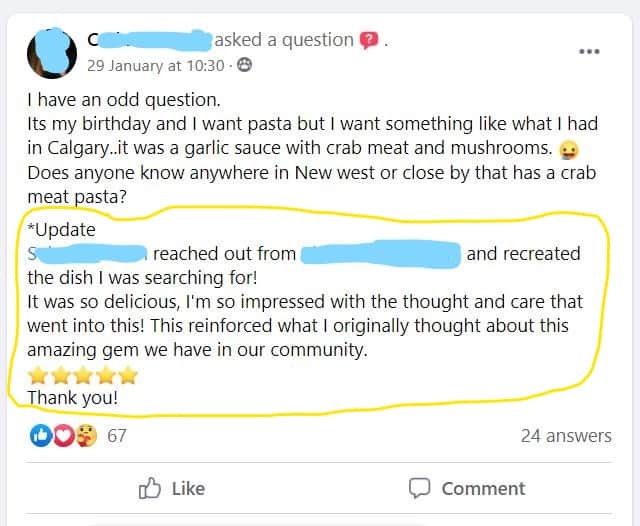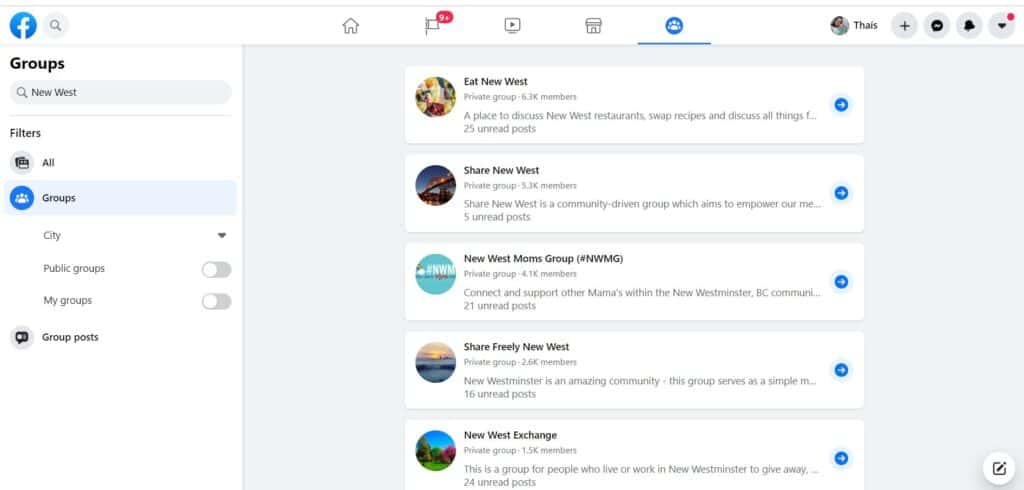New Westminster, BC, is home to more than 70,000 people, but it feels like a village. Thanks to several active local Facebook groups, we New Westies get to know each other, share ideas and ask for advice on everything from shopping to marriage counselling. One such group is Eat New West, where I recently saw a perfect example of low-budget word-of-mouth marketing with excellent results for a local business.
Word-of-mouth marketing for local businesses: A case study
In January, C posted on Eat New West, a group created to celebrate and support local restaurants, that she was craving a particular dish and asked if anyone knew where she could find something similar:

Few people suggested places that might have something. It looked like C wasn’t going to find what she was looking for until a few hours later S, group member and chef at a popular local restaurant, saw her post and used his personal profile to help C in the coolest way possible.
Chef S offered to make the dish exactly as C described it – all she had to do was email him to arrange the special meal at his restaurant. Adorable! Over 50 other members responded to the post with hearts, thumbs up, and loving emojis. Some commented on what fantastic customer service it was – especially C:

A few days later, C updated her post and wrote that Chef S had recreated the dish for her. More likes and comments about how great the restaurant is followed:

Why the Chef’s offer generated perfect word-of-mouth marketing
Through that post, group members who were already customers were even more enticed to visit the restaurant, while those who hadn’t yet been said they’d definitely visit now. Many will tell others about the excellent customer service and the care of the chef, spreading the word about the restaurant’s outstanding reputation to many more potential customers.
I don’t know if the restaurant charged for C’s meal. If not, the cost of the gift – ingredients, labour, infrastructure – was certainly less than reaching the same audience with advertising. And instead of just letting people know their restaurant exists, as ads do, they got the best result a local business could ask for: super positive word-of-mouth.
The 6,000+ members of the group where the interaction took place are foodies who love to share their experiences and take the time to discuss local restaurants and write online reviews. Not only will C remember her experience for years, but her post will come up whenever someone searches for the name of the restaurant or the food she mentioned. That’s consistent, syndicated advertising to the best audience a local restaurant could ask for.
The post is also a “goodwill credit” to the restaurant. Suppose something goes wrong and a customer complains to the group. The other members will remember Chef S and the restaurant’s excellent service and reputation, carefully analyse the situation, and give them the benefit of the doubt, rather than immediately condemning them, as I’ve seen happen with less popular restaurants.
Finally, Chef S now has even more fans in New West, which will increase his job satisfaction and strengthen his personal brand if he ever decides to open his own restaurant or look for a job elsewhere.
How to use online groups to generate word of mouth for your local business
Any local business owner can engage in social media to generate word of mouth for their business. The pandemic has motivated many people to support small and local businesses. If they like your service and feel you’re authentic, they’ll likely welcome your participation and spread the good word. Here are some tips to get involved in online groups in your area:
Find the right groups for your business
Facebook is the easiest place to get involved in local groups if you’re just starting out. To find groups in your area, log into Facebook, click Groups in the left column, and type the name of your city or neighbourhood into the search bar. This will bring up a list of groups. Select the ones where you can best reach your potential customers and join them.

Use your personal profile
Most groups don’t allow company profiles, so sign up with your personal profile. You want to make a personal connection with people in your neighbourhood, so you need to show yourself as… well, as a person.
Read and respect the group rules
On the group page, read the About the Group section and look for a pinned post with the rules. In some groups, promotional posts are allowed on certain days, in others, no business posts are allowed, etc. Follow the rules to avoid being banned, read older posts before you post, and understand how people behave and interact accordingly.
Be authentic
Adopt a friendly, helpful attitude when engaging in groups. Your goal should be to get to know your community and build relationships, not just promote your business. Did someone ask a question that’s nothing to do with your business, but you know the answer to? Answer. You have an Italian restaurant, but someone asked you about Thai food? Recommend the place you like. This won’t give you a direct advantage, but you’ll be a nice neighbour and build goodwill for you and your business.
Be consistent
Comment and visit the groups daily. Not only will you build your presence, but you’ll find posts where your expertise can be helpful or where you can organically talk about your service or product. Chef S. comments frequently in the Eat New West group – usually recommending other restaurants or answering questions about cooking – and was already known there when he offered S. the special meal.
Look for niche groups
Once you’ve mastered Facebook groups, you can also access groups on other networks, such as Reddit and Nextdoor, a promising network focused on connecting neighbours – it’s growing in New West, and I like it a lot! Depending on your service or product, you can also join niche networks like Goodreads (for authors and book lovers) and BakeSpace (for bakers to share recipes and create cookbooks.) Check out this list with 60 niche social networks for ideas.
Play the long game
The most important tip of all: Don’t engage in groups if you expect immediate results – they may happen, but it’s unlikely. If you’re patient and consistent, the results will come: You’ll build a good reputation, gain credibility, and make new friends and clients.
Learn more about Facebook Groups
Facebook Groups are so impactful, The Governance.Lab at NYU Tandon School of Engineering conducted an extensive study to understand how online groups enable people to build meaningful communities. They interviewed dozens of community experts and 50 Facebook group leaders, and analysed a global survey of 15,000 participants and internal Facebook data to publish The Power of Virtual Communities in February 2021.
I recommend reading the report to anyone who wants to use Facebook groups for their marketing strategy or just wants to understand how people are networking in today’s world.





1 thought on “Word-of-mouth marketing for local businesses through Facebook groups [case study + tips]”
[…] How to Use Facebook Groups to Create Word-of-Mouth Marketing for Local Businesses […]